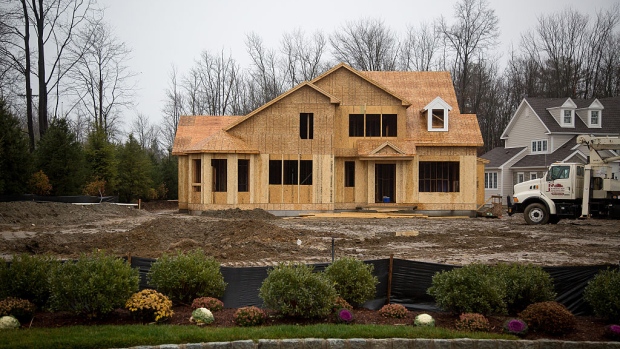Canada housing starts rebounded in March from a sluggish performance a month earlier, returning to levels more in line with demographics and highlighting the buoyancy of the nation’s battered real estate market.
Builders started an annualized 192,527 homes in March, the Canada Mortgage and Housing Corp. reported Monday. That’s up from 166,290 a month earlier, when excessively cold weather slowed construction.
While housing starts are down considerably from the elevated levels of the past two years, the current pace is largely consistent with population growth and household formation and suggests builders haven’t been scared off by recent sales declines in some of the country’s priciest markets.
“Canada’s housing market is down but far from out,” Sal Guatieri, a senior economist at BMO Capital Markets in Toronto, said in a note to investors. “The latest data on construction suggests the downward trend is stabilizing.”
The six-month moving average of starts remains near historical levels, Bob Dugan, CMHC’s chief economist, said in the release. “The trend has been very stable since the final quarter of 2018, following a period of steady declines from the historically elevated levels registered in recent years,” Dugan said.
Canadian real estate has faced headwinds over the past year, in particular higher interest rates and tougher mortgage qualification rules, that have significantly cooled markets in Vancouver and Toronto.
Major Drag
That’s prompted speculation housing could act as a major drag on future growth by depressing business for real estate brokers, banking and construction. Falling home values also damp consumer confidence and could keep households from spending.
For example, real estate transactions dropped sharply in February -- 9.1 per cent -- in a broad-based retreat. The February housing starts number was the lowest since 2015. Building permits for the month, released Monday by Statistics Canada, dropped 5.7 per cent, after a 6 per cent decline in January.
But February was even colder than normal in Canada, making the month an unreliable reading of trend. Housing numbers for March are looking stronger.
Toronto Stabilizes
Toronto’s real estate board reported April 3 that home sales in Canada’s biggest city totaled 7,187 in the month, little changed from a year earlier, though transactions are still hovering at decade lows. New listings, meanwhile, declined 5.1 per cent over the year, supporting benchmark prices, which are up 2.6 per cent over the past 12 months.
One market that continues to be unambiguously weak is Vancouver, where home sales in March fell to the lowest in more than three decades and prices continued to decline. Vancouver also bucked the national housing construction trend in March, and recorded a drop in starts during the month. Building permits in the Pacific-coast city dropped 21 per cent in February after sliding 29 per cent in January, the federal statistics agency reported Monday. The back-to-back decline of $616 million in permits is the most since at least 2002.
That market, though, is facing the most stringent regulatory regime for new home buyers, and is still the most expensive in the country by far.
Montreal home sales in March rose 1 per cent from a year ago, with prices of single-family homes up 5 per cent and condos gaining 3 per cent, the Quebec Professional Association of Real Estate Brokers said Monday.
Upcoming housing releases this month:
April 11: Statistics Canada releases new housing prices for February
April 12: Teranet/National Bank releases housing price index for March
April 15: Canadian Real Estate Association releases March transactions and price data
--With assistance from Erik Hertzberg.



